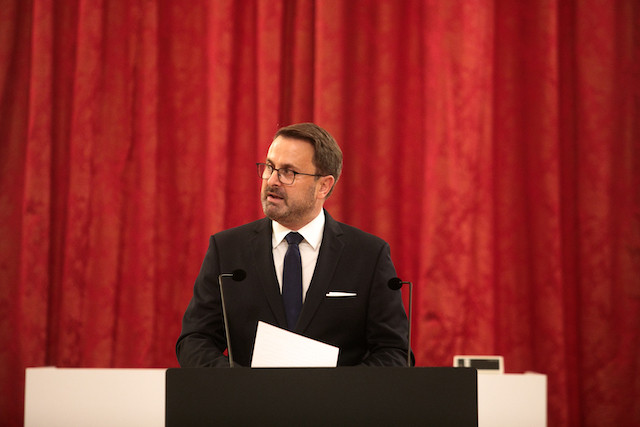“This is about justice, morals, decency,” Bettel said, after previously having shot down the introduction of a wealth or inheritance tax. “There is a need for action on some points that cannot wait until the situation allows for a more in-depth tax reform,” the PM said.
Direct and indirect revenue from real estate held in specialised investment funds (SIFs) will be taxed by 20%, Bettel announced. The funds are currently only subject to a subscription tax of 0.01% of their net assets. Around 145 real estate SIFs are active in Luxembourg, the PM said, not all of them active in the local market though.
In addition, the government wants to prohibit family wealth managers to acquire and hold real estate through third party firms. “It is currently possible for some players to act on the Luxembourg property market virtually tax free,” Bettel said. “This is no longer acceptable.”
The current regime of stock options--that allows high earners to have some of their income paid in stock options--will be abolished starting January 2021. The stock options are taxed at a lower rate (13.27-22.75%) than the 42% maximum income tax bracket.
Motions to tax SIFs and abolishing the stock options regime were voted down by the coalition parties in parliament at the end of September. A fully-fledged tax reform will remain on the horizon for 2023.
Stimulus
The state of the nation address is normally held in April or May but was delayed because of the coronavirus pandemic, which also dominated the premier’s speech. “If we don’t respect the rules now, then all the months in which we worked together to keep the virus in check were for nothing,” Bettel said.
He announced that partial unemployment support for companies impacted by the coronavirus pandemic would continue into next year. The European Commission this morning paved the way for state aid payments to last into the first half of 2021 without violating EU rules.
“Economic activity is slowly increasing,” Bettel said, adding that there was room for cautious optimism. The government had anticipated a deficit of €5bn because of the virus, but this will be closer to €4.4bn, he said. Revenue of around €1bn was missing in state coffers at the end of August, the PM said.
Still, the government plans to increase investments, from 3.7% of GDP this year to 4.3% of GDP next year, an increase of more than €2.7bn. Finance minister Pierre Gramegna on Wednesday morning is submitting the 2021 budget as well as an outlook on state finances until 2024.
“Much, if not everything, depends on how the health situation is today and how it will develop further,” Bettel said.
Respect the rules
The number of active infections stood at 1,364 on 11 October, the latest update available, and Luxembourg has added around 1,000 cases to its tally of infections since the start of the month.
After seeing no new covid-19 deaths between mid-September and 1 October, eight people have died of the virus over the last ten days. The number of patients receiving hospital care for the virus has more than doubled since the start of October. “We are on alert but not shocked,” Bettel said, explaining that they had expected an increase in cases in the autumn.
“We don’t need fundamentally new measures,” Bettel said, but added that the restrictions already in place need to be respected. “For adults, covid-19 is three to 13 times more dangerous than the seasonal flu,” Bettel said. “This is scientific fact,” he said, adding that he finds it “incomprehensible” for people to insist otherwise.
“We depend on one another,” the PM said, adding that the next months will be tough as more people will meet indoors where the virus is at greater risk of spreading. “It will be a challenge for all of us and we must continue showing solidarity.”
Climate, housing, Brexit
In his nearly two-hour speech, Bettel said the government wasn’t exclusively working on tackling the pandemic.
“Climate change is the big challenge of our time,” Bettel said, repeating the country’s ambitious climate goals to reduce emissions by 55% over the next decade. “It is a real and for us realistic target.”
A CO2 tax to be introduced next year will add around 5 cents per litre to the cost of petrol and diesel, Bettel said. More than 285km of cycling paths are already being planned with routes along another 148km being assessed.
While Bettel didn’t reference the failed Fage yoghurt plant project, the PM said the government is in the process of developing guidelines on the use of resources and how this can be combined with industrial development.
He also said the housing ministry’s budget would increase by 11% next year, with the government investing in acquiring buildable land and subsidising housing projects. “There is no simple solution” to the housing squeeze, Bettel said, just days after around 1,000 protesters took to Luxembourg’s streets to demand access to affordable housing.
The pandemic had also shown the need for digital inclusion, valorising jobs in education, culture and the healthcare sector, and improving the inclusion of people living with a disability, Bettel said. The premier also pointed out the importance of media pluralism and independence, which will be strengthened through a reform of state aid.
The prime minister pledged Luxembourg’s support for the EU, saying the bloc faces great challenges, including the departure of the UK. Negotiations on a trade deal had not advanced well, Bettel said, adding that the financial centre was ready to work with the City of London even without a trade deal.
Last year, Bettel prioritised climate change, Brexit and data protection in his speech without, however, announcing any new policy measures. His address faced widespread criticism--even among coalition parties--for failing to address key issues such as housing, transport, the distribution of wealth and how to make growth sustainable.
Members of all parties represented in parliament will have time over the coming two days to comment on this year’s speech.
